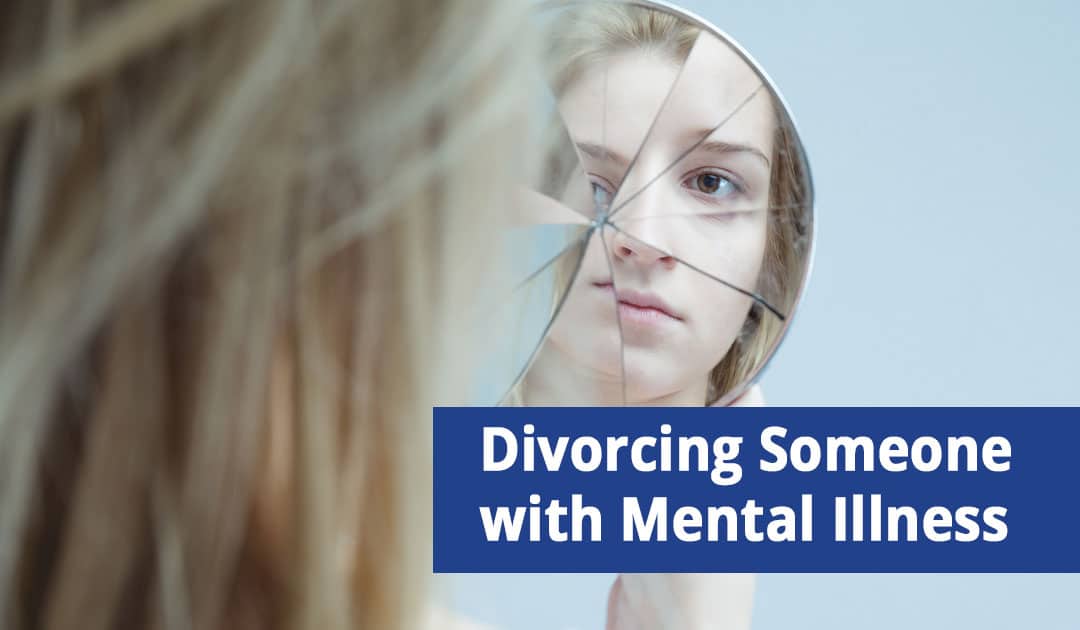Compassionately Divorcing Someone with Mental Illness on Long Island, NY

Mental illness is no one’s fault, but it can often make that person difficult to live with and maintain a healthy relationship. Of course, if you love your partner, you will want to help them get the professional help they need to cope with their mental illness. Often, this will help your partner manage their mental illness and may improve your relationship. All too often however, some people refuse to get help or do the work necessary to help resolve or learn to manage their condition. This can make them impossible to live with and may necessitate getting a divorce to protect yourself and your future.
If your spouse is struggling with a mental health condition, and you want to get a divorce, you may feel guilty or even responsible for their wellbeing. Here’s what you can do to separate from your spouse with care and compassion on Long Island, NY.
Ensure Your Spouse Has Professional Support
If they don’t have professional support already, you can help your spouse find a psychiatrist, psychologist, or therapist with whom they are comfortable and motivated to get professional treatment for their mental illness. You may want to wait until this is in place before you give your partner the news so they have someone with whom to work through this likely traumatic event.
Get Professional Support for Yourself, Too
It’s also important to ensure that you have qualified support to help you process your emotions about the divorce. Even if you’re not mentally ill yourself, working with a counselor or even a divorce support group can help you heal from the normal distress that comes along with the end of a meaningful relationship. When your partner is mentally ill, a professional can help you deal with potential feelings of guilt that may be associated with initiating divorce proceedings.
Consider Petitioning for Full Child Custody
If you have children, and your spouse’s mental illness makes it difficult for them to safely care for them, you may want to consider filing for full child custody. You will need to be able to show evidence to make your case, such as medical records or reports of your spouse’s behavior that provide the court with insight into their dynamic with your children.
With time and treatment, the majority of people with mental health conditions can be great parents. However, if you are concerned that your partner is a threat or a danger to your children, it’s critical that you protect them. Some mentally unwell people can be pushed to their breaking point by the demands of being responsible for a child’s welfare.
If you believe your children are unsafe with your spouse, include as much information as possible with your petition. You can request that the court review whether or not your spouse should only have supervised visitation or, in rare cases, if parental rights should be revoked.
Set Clear Boundaries with Your Spouse
If you’re co-parenting with a mentally ill spouse, navigating things like pickups, drop offs, discipline, and healthcare can be extra challenging. It’s important that you have firm boundaries with your spouse about when and where pickups or drop offs will happen, when and how you will communicate with each other, and what types of behavior are unacceptable. Be kind and compassionate, but be clear and firm.
If possible, get these boundaries in writing. A court may be able to help you enforce terms of your child custody or divorce agreement, but can’t provide you with any legal support if you and your spouse only verbally agreed to terms with one another.
Prepare To Pay Alimony
In the event that your spouse’s mental health condition prevents them from becoming gainfully employed, you may be required to pay spousal support for a period of time following the divorce. For spouses who are mentally ill and cannot be expected to provide for themselves at any point in the future, alimony may be permanent.
Document Everything
In addition to gathering whatever evidence you already have, it’s important that you continue to document everything that happens or is said between you and your ex. This is important should you find yourself back in court with your ex and you need evidence to help bolster your argument later on.
For example, your ex-spouse may seem fit to co-parent with you initially, but if their mental health condition regresses, this arrangement may no longer be in the best interests of your child or children. Since the judge has already made a ruling on your ex’s parental rights, you’ll need to request a modification of court orders and show new evidence that these rights should be revoked or modified.
Get Help from a Qualified Long Island, NY Divorce Lawyer
Ending your marriage with someone who struggles emotionally and psychologically is a double-edged sword. You might feel relieved, afraid, and even worried about your ex’s future wellbeing once the divorce is finalized.
But first and foremost, you need to protect the best interests of you and your children. Contact the experienced Long Island, NY divorce attorneys at Hornberger Verbitsky, P.C. for more information or to schedule your free initial case consultation by calling 631-923-1910 or fill out the short form on this page and we’ll get back to you ASAP.
GET YOUR FREE CONSULTATION TODAY
Call 631-923-1910 or fill in the form below

Get your complimentary consultation and case evaluation with our experienced attorneys today.
Your attorney will describe the many options available and determine together which is the right solution for you. By the end of this conversation, we’ll all understand how we can best help you to move forward.
No Cost or Obligation
There is no cost or obligation for this initial consultation. It is simply an opportunity for us to get to know each other, answer your questions and learn if Hornberger Verbitsky, P.C. is right the right law firm for you. Give us a call at 631-923-1910 or fill in the short form below for your free consultation and case evaluation.
All Fields Are Required
About the Author
Robert E. Hornberger, Esq., Founding Partner, Hornberger Verbitsky, P.C.
- Over 20 years practicing matrimonial law
- Over 1,000 cases successfully resolved
- Founder and Partner of Hornberger Verbitsky, P.C.
- Experienced and compassionate Long Island Divorce Attorney, Family Law Attorney, and Divorce Mediator
- Licensed to practice law in the State of New York
- New York State Bar Association member
- Nassau County Bar Association member
- Suffolk County Bar Association member
- “Super Lawyer” Metro Rising Star
- Nominated Best of Long Island Divorce Attorney four consecutive years
- Alternative Dispute Resolution Committee Contributor
- Collaborative Law Association of New York – Former Director
- Martindale Hubbell Distinguished Designation
- America’s Most Honored Professionals – Top 5%
- Lead Counsel Rated – Divorce Law
- American Institute of Family Law Attorneys 10 Best
- International Academy of Collaborative Professionals
- Graduate of Hofstra University School of Law
- Double Bachelor’s degrees in Philosophy, Politics & Law and History from SUNY Binghamton University
- Full Robert E. Hornberger, Esq. Bio













